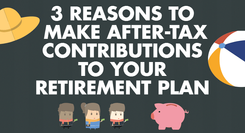Related Posts
Employers and Organizations
401k Withdrawal and Retirement Borrowing Should be a Last Resort – How Financial Wellness Can Help Your Employees
Last Update: April 19, 2021
Financial Impact of a Global Pandemic and 401k Withdrawal
The COVID-19 pandemic wreaked financial havoc on millions of people, spotlighting the need for financial wellness.
The unemployment rate spiked over 14% in April of 2020. Even today, more than 6 million Americans remain unemployed.1
In 2020, many people turned to their retirement accounts to make ends meet, not realizing the effects early withdrawals have on future savings.
CARES Act Provision
The 2020 CARES Act provided an exception to early withdrawal penalties from qualified retirement accounts.
Rather than pay a 10% penalty, Americans could get up to $100,000 penalty free withdrawals, but they would still owe income taxes.
Skipping the penalty tempted many people to withdraw money from their accounts. One survey shows 31% of people withdrew money in 2020 that was otherwise meant for their retirement plan.
Most used the early withdrawals to cover basic living expenses and medical bills.2
While this may have seemed like a smart way to cover bills, the long-term impact a 401k withdrawal has on retirement savings makes it an option of last resort.
Impact of Early Withdrawals from Your Retirement Account
The power of compound interest is what makes saving early for retirement so important.
The best tool for growing money is time.
Withdrawing even a small amount from a retirement account can significantly affect how much money is available down the road.
$5,000 now can turn into more than $38,000 in thirty years, assuming a 7% annual return. Add another five years on, and that $5,000 has turned into $53,000.3
So, while it may be tempting to withdraw money and use retirement savings to cover bills, it is actually harmful to your future nest egg.
Unfortunately, in 2020 53% of Millennial and Gen-X workers expect to use retirement savings for other expenses,4 perhaps because they don’t know any better. That number is up from 35% in 2015.5
And 27% of workers had already dipped into those 401 K retirement funds to withdraw money even before the pandemic.6
CARES Act Withdrawals
A survey of those who withdrew funds through the CARES Act showed that only 17% of respondents withdrew less than $25,000.
That means 83% of those surveyed took between $25,000 and $100,000 from the funds they will later need to live on.2
It is no wonder, then, that 51% of employees expect to be working during retirement – either because they want to or, more likely, out of financial necessity.4
Pandemic Increases Financial Stress
Dwindling 401 K and retirement funds is just one example of how the pandemic has put a spotlight on financial literacy.
Finances are the single biggest cause of stress in Americans' lives, with nearly a third saying that stress has harmed their health or relationships.7
Worrying about finances and your retirement plan can lead to more symptoms of depression and anxiety, as well as disrupted sleep and high blood pressure.8
And that is even before the effects of the pandemic are considered.
Three Reasons Financial Education is More Important than Ever
Financial knowledge has been continuously declining in America.
A study by FINRA asking five basic financial questions of people showed that 66% got 3 or fewer correct in 2018, compared to 58% in 2009.
1. The Pandemic
The onset of the global pandemic cost Americans a record 20.5 million jobs in the span of a month.
It caused volatility in financial markets and cost some people large portions of their investment portfolios.
2. Defined Contribution Plans Replacing Defined Benefit Plans
There has been a slow transition from defined benefit retirement plans, like pensions, to defined contribution plans, like 401 k.
This has put more of the responsibility for investment and saving decisions on the individual.
But nearly 60% of people have low confidence in their ability to make those decisions.9
3. Questions about Social Security
Social Security is becoming less reliable, as fewer than half of workers think Social Security funds will be available when they retire.6
Without Social Security, a major safety net that many people rely on for retirement will be gone.
Promoting Financial Literacy
Financial education can help people learn and understand debt management, saving, and investing, all of which can help reduce stress.
And financial knowledge is in high demand. More than a quarter of employees surveyed said a financial wellness program offered by their company would be their top pick of benefits.6
April is National Financial Literacy Month, which makes it an ideal time to focus on education, especially amid the fallout from the COVID-19 pandemic.
The National Endowment for Financial Education introduced the idea of Youth Financial Literacy Day, which evolved into Financial Literacy month.
President Obama declared April of each year a time for Americans “to improve their understanding of financial principles and practices.”10
Here are some resources to use during National Financial Literacy Month:
The State of Workplace Financial Wellness
Financial Wellness Program Best Practices Guide
Effects of Financial Literacy on Health
1 - https://www.bls.gov/charts/employment-situation/civilian-unemployment-rate.htm
2 - https://www.kiplinger.com/retirement/retirement-planning/601934/retirement-planning-during-covid
3 - https://www.investor.gov/financial-tools-calculators/calculators/compound-interest-calculator
4 - https://www.pwc.com/us/en/industries/private-company-services/images/pwc-9th-annual-employee-financial-wellness-survey-2020.pdf
5 -https://www.pwc.com/us/en/private-company-services/publications/assets/pwc-employee-financial-wellness-survey-2015.pdf
6 - https://www.theexperience.work/wp-content/uploads/2018/06/pwc-2019-employee-wellness-survey.pdf
7 - https://www.theexperience.work/wp-content/uploads/2018/06/pwc-2019-employee-wellness-survey.pdf
8 - https://www.marketwatch.com/story/one-big-reason-americans-are-so-stressed-and-unhealthy-2018-10-11
9 - https://www.federalreserve.gov/publications/files/2019-report-economic-well-being-us-households-202005.pdf
10 - https://obamawhitehouse.archives.gov/the-press-office/2016/03/31/presidential-proclamation-national-financial-capability-month-2016
Featured Posts

Employers and Organizations
3 MIN
10 Simple Ways Benefits Managers Can Recession-Proof Their Employee Benefits Package

Employers and Organizations
3 MIN
3 Reasons to Make After-Tax Contributions to Your Retirement Plan

Employers and Organizations
4 MIN
Financial Information vs Employee Behavior Change: Which Is More Important for Your Company’s Financial Wellness Program?

Employers and Organizations
3 MIN
Does Your Employee Financial Wellness Program Take Mindset Into Consideration?
Related Posts

Employers and Organizations
3 MIN
Financial Wellness Becomes One of the Most Desired Benefit Programs for 2021

Employers and Organizations
2 MIN
How to Increase Workplace Loyalty with This Financial Wellness Strategy

Employers and Organizations
3 MIN
New Study Shows Alarming Post-COVID Financial Wellness Trends
